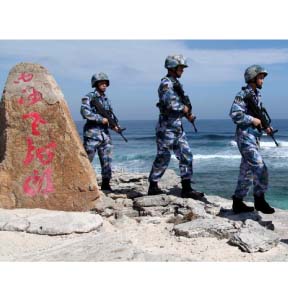
June 9 marked the 44th year of the opening of our diplomatic relations with the People’s Republic of China. Unlike previous years, there appears to be fewer commemorative activities organized, whether officially by the government or by nongovernment organizations promoting Philippines-China relations.
No symposiums, conferences, exhibits and cultural performances to celebrate the event except those traditionally spearheaded by the Chinese-Filipino community. The reasons for this inaction and neglect can be attributed to several factors.
First: China’s claim of sovereignty over the South China Sea encroaches on the territorial areas of the countries facing the sea. Besides the Philippines, Vietnam, Malaysia, Brunei Daru Salam and Taiwan are also claimants to portions of the South China Sea.
Not only did China ignore Philippine sovereignty over the 200-nautical mile exclusive economic zone (EEZ) under the UNCLOS (United Nations Convention on the Laws of the Sea), China also built artificial islands on Mischief Reef (Panganiban Reef), installed military equipment, destroyed coral reefs which are the habitat of numerous aquatic life.
In addition, the Chinese organized its “maritime militia” that, together with the People’s Liberation Navy, drive away and harass small, artisanal Filipino fisherfolk who make their living by fishing in the area.
Meanwhile, the Chinese fishermen harvest large amounts of aquatic resources, including endangered and protected species like giant clams (Tridacna gigas and Tridacna squamosal).
Instead of punishing the small unarmed Filipino fishermen, China should have initiated negotiations on more rational ways of sharing resources and obligations on ecological conservation.
Second: China rejected the decision of the International Arbitration Court that stated that China’s claim over the South China Sea is invalid. China overlooked the reasons why our government sought aid from the United States of America.
As a small, poor, militarily-weak country whose foreign policy, social and cultural institutions are closely linked with the US for over 100 years, it is understandable that the government sought US aid to counter China’s increasing military might.
The complaint lodged by former Foreign Affairs secretary Albert del Rosario and former Ombudsman Conchita Carpio-Morales against President Xi Jinping at the International Criminal Court follows this line of thinking among Filipino ruling elites.
China’s decision to bar entry of Carpio-Morales to Hong Kong on May 21 is viewed by Del Rosario as China’s retaliatory action on ordinary citizens, which only serves to stiffen anti-China attitudes of some Filipinos.
China fails to understand that the majority of the ruling elite who control the levers of power in the Philippines are also the land-owning class who favor American foreign policy and ideology.
This explains why the government under Benigno S. Aquino III halted bilateral negotiations and lodged its sovereignty claim over the EEZ at the International Arbitration Court. The court’s decision, favorable to the Philippines, was rejected as “invalid” by China, resulting in the closing of avenues for compromise.
Why does China insist on sovereignty over most of the South China Sea? Why does China refuse to concede 200 nautical miles of EEZ to other claimants?
Third: China’s actuations contradict its high-sounding benign policy statements as articulated by President Xi Jinping at the 19th Congress of the Communist Party of China.
China, according to Xi, will “never seek to be the world’s hegemon;” that China would promote economic development that is “open, inclusive” and beneficial to all countries big and small who are all equal partners in achieving “common destiny for all mankind;” that China seeks to foster peace, economic, technological and scientific cooperation to raise peoples’ livelihood especially in developing countries; and finally, China stresses that all economic development efforts must strive to conserve the environment.
China claims the South China Sea, installs military facilities in the Panganiban Reef and strengths the range and scope of her navy from her eastern seaboard all the way to the horn of Africa and the Persian gulf. These are clear indications of power projections.
No wonder these actuations provoke the US to intensify its military power along the sea lanes that is leading to another arms race and thus exacerbates global tensions. China thereby allows herself to be drawn into US war games policy that provokes conflict, intensifies and prolongs conflicts in order to feed its huge military-industrial complex.
The US under Donald Trump takes the cynical view that only war can ensure its dominance of the global social-political-economic system.
China, the Philippines and all other claimants over the South China Sea should continue peaceful negotiations on our territorial disputes, with all parties willing to be flexible, pragmatic, adaptable and considerate of each other’s interests and concerns.
In the meantime, everyone should continue with all other aspects of economic, social, cultural and environmental cooperation. The Philippines, as a member of ASEAN and a developing country, should join forces with all organizations that promote peace and together pressure the US, Russia, China, NATO (North Atlantic Treaty Organization), the European Union, Israel, Saudi Arabia, Iran to cooperate to solve poverty, hunger, disease, combat extremism, racism and injustice.
